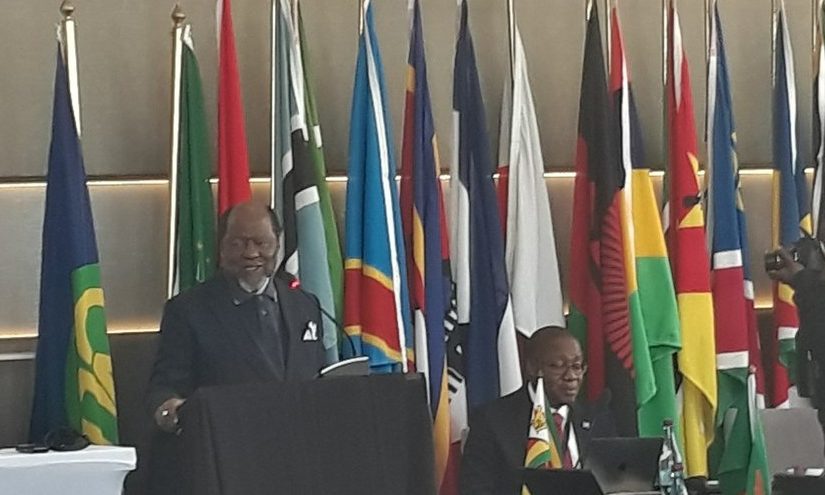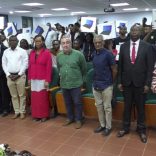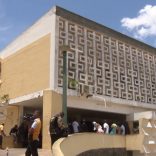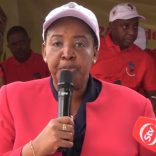Mozambique: Spanish Foundation stresses urgency of efforts to combat child mortality - Watch
Funding gap threatens ‘End Aids by 2030’ goal in the SADC region – Chissano

Photo: @UnaidsNamibia
Former Mozambique President Joaquim Chissano has expressed concern at the widening funding gap of HIV and Aids response mechanisms in SADC saying that this is threatening the attainment of the ‘End Aids as a global public health problem by 2030’ campaign in the region.
In a speech during the SADC Ministers responsible for HIV and Aids meeting last week, Chissano urged member states to scale up efforts in domesticating sustainable resources for HIV and Aids responses.
This comes at a time HIV and Aids donor fund pool globally has decreased by US$7 billion from the total figure that was estimated by 2020 to attain the ‘End Aids as a global public threat by 2030’.
It is estimated that worldwide, official aid for health declined from 33.6 percent of health expenditures among low-income countries to 19.4 percent of health expenditures among lower middle-income countries.
“As champions, we remain gravely concerned by the ongoing funding crisis that is not only affecting the SADC region, but the entire continent and the world. Worldwide, the funding for prevention and treatment has flatlined. We are informed by UNAIDS that the total amount of resources from all sources for HIV in 2016 was US$19.1 billion, US$7 billion lower than the necessary resource estimated by 2020 if we are to be on track to end Aids as a global public health threat by 2030,” he said.
Chissano said if the funding gap is not bridged, the shortfall may reverse the efforts and achievement that the region has made in HIV and Aids response.
“Sub-Saharan countries cannot and would not end Aids alone. Aids is a global challenge. Meeting the 2020 targets and ending Aids by 2030 is at risk unless the scale-up of services and funding is increased. The end is only possible if the international and donor community, the private sector and governments sustain and step up their funding particularly for economically constraint countries bearing the greatest burden of Aids,” he said.
He, however, commended efforts being made by member states in domestic resources mobilisation innovations in the response to HIV and Aids such as the Aids levy, funded President’s Comprehensive Response plan and the establishment of HIV trust funds among several others.
The former Mozambican president urged SADC member states to ensure that all the innovations being established were sustainable and should not replace the existing government allocations. He said governments from the member states should also continue to engage with the private sector to be fully on board in the initiatives.
“We must continue to strive to improve efficiencies in using the available resources to allow us to save what we have so that we can use it for generating additional outputs. We have to do more and do better with less. We are encouraged as champions that our countries recognise the importance of closing the funding gap created by the flat lining and in some cases, the receding external support.
“Domestic resources, mainly public, continue to be the main driver of the increase of resources for the response to HIV. The percentage of domestic resources out of the total is 56 percent on average for all low- and middle-income countries. We are seeing gradual increases in the domestic allocations for HIV and health, with some of our SADC countries funding more than 50 percent of the response from domestic public resources. A very encouraging development indeed. However, we are concerned that 25 countries in Sub-Saharan Africa are investing less than 25 percent of the total Aids budget. We must move with urgency to do more,” said Chissano.
He said the goal of ending Aids by 2030 can be attainable with a committed leadership that has policies and strategies that does not discriminate.
The elimination of stigma and discrimination and full recognition of human rights were the cornerstones of sustainable progress.
He urged SADC member states to repeal laws that undermined access to HIV and health services for all and ensure that no one was left behind.
“I want to take a moment to recognise the recent High Court decision in Botswana along with the January decriminalisation of same sex relationships in Angola. We must learn from them and others that came before, like my own country Mozambique. We must ensure that Africa’s potential for attaining a healthy and productive continent, free of discrimination and stigma is attained,” he said.
By Sharon Kavhu
Former Mozambique President Chissano hails AIDS levy as a good domestic strategy of sustaining HIV Epidemic Control. @naczim pic.twitter.com/vBurxRwRIY
— NAC Zimbabwe (@naczim) June 21, 2019
Former President of Mozambique & Vice-Chairman of Champions for AIDS-Free Generation, Dr Joaquim Alberto Chissano, echoes a message from all Champions & encourages SADC countries to move to a sustainable HIV response. “We must remain vigilant so as not to lose the gains made” pic.twitter.com/M3ZUk7h9lC
— UNAIDS NAMIBIA (@UnaidsNamibia) June 20, 2019












Leave a Reply
Be the First to Comment!
You must be logged in to post a comment.
You must be logged in to post a comment.